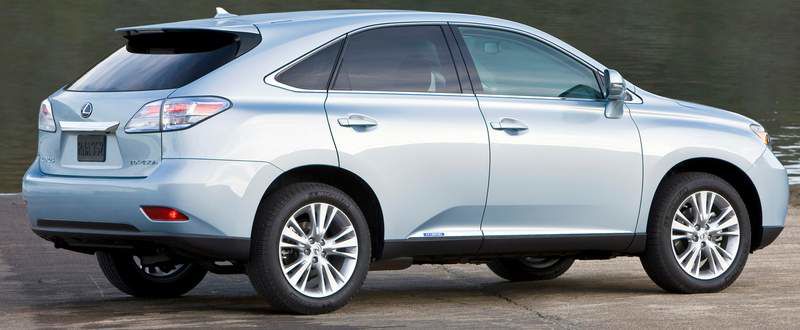Lexus and the greening of the hybrid crossover
Published 5:00 am Sunday, June 21, 2009

- The 2010 Lexus RX 450h introduces Toyota Motor Corp.’s sixth-generation hybrid system. This is the first Lexus hybrid that lives up to the hype and puts up big numbers: an impressive 35 miles a gallon in town and 31 on the highway, for a combined average of 32 mpg over a week of driving a pre-production model.
I have been hard on Lexus hybrids. Unlike the honestly frugal Toyota Prius, the gas-electric Lexii often struck me as costly impostors, green on the surface but rarely delivering on their performance of high performance and exceptional economy.
Each Lexus hybrid I’ve driven, from the RX 400h crossover to the LS 600hL sedan, struggled to go 25 miles on a gallon of gas. Such middling economy hardly justified prices $5,000 to $20,000 above the conventional versions.
Hybrid fans can breathe easier around the new RX 450h, and for more than its lowest-in-class emissions, including 20 percent less carbon dioxide output than a 4-cylinder Honda Accord. This is the first Lexus hybrid that lives up to the hype and puts up big numbers: an impressive 35 miles per gallon in town and 31 on the highway, for a combined average of 32 mpg over a week of driving a pre-production model. That makes the RX 450h the highest-mileage midsize crossover I’ve driven — by far.
Those numbers took no unusual effort and no nerdy hypermiling. I did avoid full-throttle acceleration, coasted when possible and tried to keep the Eco light glowing on the dash.
Where many hybrids have fallen short of their government mileage ratings, the Lexus exceeded them: I crushed the estimates of 30/28 mpg in city/highway driving for the all-wheel-drive model I tested. (The front-drive model has a 2 mpg edge in town, at 32/28 mpg.)
So why did the new RX — which is bigger, heavier and more powerful — do so well? Paul Williamsen, a Toyota technology spokesman, cites several developments. The previous hybrid’s 3.3-liter, 208-horsepower engine was the last survivor of an engine family that dates to 1998. The modernized 3.5-liter V-6 is more powerful at 245 horsepower, yet much more efficient. (The combined horsepower from gas and electricity jumps to 295 from 245.)
Like the Prius’ engine, the RX hybrid’s runs on the Atkinson cycle, notable for a low compression ratio, yet a relatively high expansion ratio inside the cylinders. In simple terms, it wastes less energy to squeeze fuel and air together, and makes relatively more when that mixture explodes.
The engine itself runs on an extremely free-flowing oil, 0W-20. In modern engines, lighter oils are an important economy factor, with less energy lost to friction. For the Lexus, less friction allows an oil pump that operates on less power.
The RX introduces the sixth generation of Toyota Hybrid Synergy Drive, the best yet at squeezing maximum current through the electric motor-generators — whether they’re powering the car or capturing energy from braking — without the heat getting out of control.
Toyota says its high-current transistors are the world’s first auto application with liquid cooling on both sides — the transistors are sandwiched between cooling layers of heat exchangers. In sports terms, it means more playing time for the electric motors, with the engine allowed to rest on the bench.
Starting at $42,955, the front-wheel-drive hybrid features dual electric motors up front; the $44,355 all-wheel-drive model adds a third electric motor that runs the rear wheels when the front tires slip or the driver floors the throttle. Both models still cost about $5,000 more than their gas-only counterparts.
The electric assist helps the hybrid run from 0 to 60 mph in about 7.5 seconds, a close match for the gas version.
As hybrids go, the Lexus is now among those that feel most like a conventional car. The gas engine stops and starts almost imperceptibly. The regenerative brakes still feel slightly unnatural, but they’ve shed the squishy, tentative feel of the past. There’s less whirring and clicking from the electric motors inside the quiet cabin.
If the spoiled beauties in the sci-fi film “Logan’s Run” had a car, this would be it. Like its conventional RX 350 sibling, the RX 450 is ideal transportation in a tranquilized paradise. Everything, from low-effort steering to the creamiest leather this side of a Bentley, is designed not to trouble its occupants.
The Lexus isn’t remotely sporty, but I’m convinced that most people driving luxury crossovers don’t lose sleep over lap times.
One more point, and this comes from a big fan of modern diesel engines: In any mileage skirmish with the RX, diesel rivals end up bagged and tagged. Even on the highway, the RX 450h beat three German diesels — the Audi Q7 TDI, BMW X5 xDrive 35d and Mercedes ML320 Bluetec — posting 31 mpg versus a best-case 27 mpg for the diesels. Over all, the Lexus beat the Teutonic trio by 10 mpg, at about 32 vs. 22. Most notably, the Lexus roughly doubled their economy in city and suburban runs, where the diesels managed only 16 to 19 mpg, versus 32 to 35 for the Lexus.
Bottom line, if you manage 30 mpg in the RX hybrid — trust me, it’s easy — and the typical 20 mpg in the standard RX 350, the hybrid will save you $700 a year in premium fuel (at a current national average of $2.77 a gallon), balancing out its added cost in roughly seven years of ownership. You’d also cut your gas consumption by a substantial 1,750 gallons over those years, and make far fewer stops to refuel.
Compared with the fuzzy math of previous Lexus hybrids, the numbers can actually add up.
2010 Lexus RX 450h
Base price: $41,660
Type: Front- or all-wheel-drive midsize luxury hybrid crossover
Engine: 3.5-liter hybrid V-6, with high-output, permanent-magnet, electric-drive motor
Mileage: 35 mpg city, 31 mpg highway






